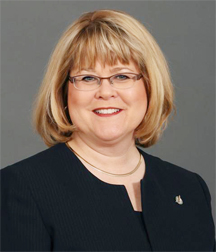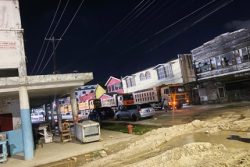With drugs smuggled via Caribbean ports to Canada continuing to be an issue of concern, Ottawa is working with the region to establish a mechanism for better information gathering, analysis and sharing, the country’s Minister of State of Foreign Affairs, Diane Ablonczy says.
This is being done under the Anti-Crime Capacity Building Programme (ACCBP) funded by Ottawa which spans areas such as drugs, human trafficking interdiction, combating violent organized crime, and police and judicial reforms. “Some of what we’re funding is for better information gathering, better information storage through providing the technology for the information to be computerized and of course better information sharing,” the minister told Stabroek News in an interview yesterday. “Trans-national criminal organizations don’t recognize borders and so we have to work as a unit, as a region on fighting this kind of activity and that’s one of the tools we are putting into place,” she said.

Over the years, including several busts this year, Canadian security officials have found cocaine in products on vessels that have originated in Guyana.
Ablonczy, who arrived here on Sunday as part of a Caribbean visit, said that drug smuggling continues to be a “real issue” and pointed out that Canada invests millions of dollars into the Americas with much of this funding coming to the Caribbean to strengthen the institutions that fight crime. These include the police, the military, border security, special units and tracking of the proceeds of crime because they want to ensure that criminals can be tracked and caught. In addition, strengthening of the justice system is also covered so that when criminals are caught, they will be prosecuted and jailed, she said.
Apart from training, the minister said that Canada is also working to provide the tools because “you can know what you want to do but if you don’t have the technical equipment to do it with then you can’t be effective.” She pointed out that Ottawa is working with the Barbados-based Regional Security System, both for training and in partnership with other countries to provide them with equipment upgrades such as aircraft and surveillance equipment. She said that Canada is also working with other countries in Europe and North America on reducing the demand for drugs.
Drug usage
Ablonczy also expressed concern over increased drug usage in transit countries like Guyana. “One of the troubling trends that we see is increased use of drugs in the…transit countries,” she said. “It’s very destructive for young people and its destructive for the future of a country because these are the leaders of the future so we all have a big stake in pushing back against this activity and protecting those who would be drawn into it if we don’t fight it,” the minister emphasized.
Canada has been playing an increasingly large role in the mining sector here and Ablonczy said that it has been a huge boost to local workers and the economy. “We are very committed to sharing our expertise to encouraging investment from Canada into Guyana and to do it in a way that is socially and environmentally responsible,” she added.
The minister said that Canada is a very strong proponent of sustainable development and responsible environmental stewardship in economic and resource development. She related that there is a protocol set for Canadian companies operating in foreign countries. “The protocol is that our companies would comply with local laws, that it would be environmentally responsible, that it will use good labour practices, that it will assist local communities through job training and local development,” the minister said. She pointed to examples such as companies setting up training institutions and medical clinics.
Social
responsibilities
Ablonczy pointed out that they also expect companies to follow the social responsibilities protocol. She said that if they receive a complaint that a company is not complying with regulations, there is a resolution mechanism whereby the companies will be working with Ottawa to rectify any concerns. The minister said that in countries which she has visited, she has asked officials to let her know about any concerns with regards to the way Canadian companies operate and they have had very good reports of the way Canadian companies conduct themselves.
Earlier yesterday, the minister at a meeting with Minister of Natural Re-sources and the Environment, Robert Persaud, asked about any concerns with regards to Canadian companies operating here and he said that generally, there is “no cause for significant worry.”
Ablonczy told Stabroek News that the companies know that being environmentally and socially responsible will lead to their success so they are not reluctant to adhere to the protocol and are supportive of it and enthusiastic about using good practices.
It was noted that the protocol is not enshrined in Canadian law and allows for flexibility because conditions vary from country to country and it is difficult to have a single set of rules that companies have to follow in every case. The minister said that they are also proud of the companies and it is their belief that governments should not put laws in place unless they are needed and “in this case we have found that companies operate very responsibly in a voluntary manner.”
The minister said that there is a real appreciation for Guyana’s tremendous resource wealth and she pointed out that Canada has some of the same resources and has built up expertise over the years in how to best develop those resources and do so responsibly and that is one of the reasons Canada has such strong social programmes. “We’re happy to share that expertise with our friends here in Guyana. We also have companies with investment dollars that are willing to come and pay for the installation and the mining projects that have to be put into place.
They are very expensive to build…resources in the ground don’t help anybody but it does take both expertise and money to develop them responsibly but the good news is that jobs flow to Guyanese workers,” she said.
CARIBCAN
Meantime, in relation to the CARICOM-Canada trade agreement, CARIBCAN, the minister said that at this point it is uncertain whether it will be renewed again past the December 2013 WTO waiver extension, but talks continue about trade arrangements between Canada and CARICOM. “In our experience the trade agreements have removed obstacles to us doing business together with our partners on the other side of the agreement. It has in every case, increased trade and investment between our country and the other country and it’s also brought more certainty to investors because the rules are more clear and there is a dispute resolution mechanism and so we found them to be real door-openers for both trade and investment,” she said adding that jobs are also created. She said that she believes that a trade agreement between Canada and CARICOM would increase the level of trade, increase the level of investment and increase jobs and opportunity for citizens.
In relation to governance in the region, Ablonczy said that Ottawa is pleased. “We see an increasing commitment to the rule of law, to democracy, to the engagement of citizens” and although there is backsliding from time to time in various places, the hemisphere is becoming more and more democratic, she said.








